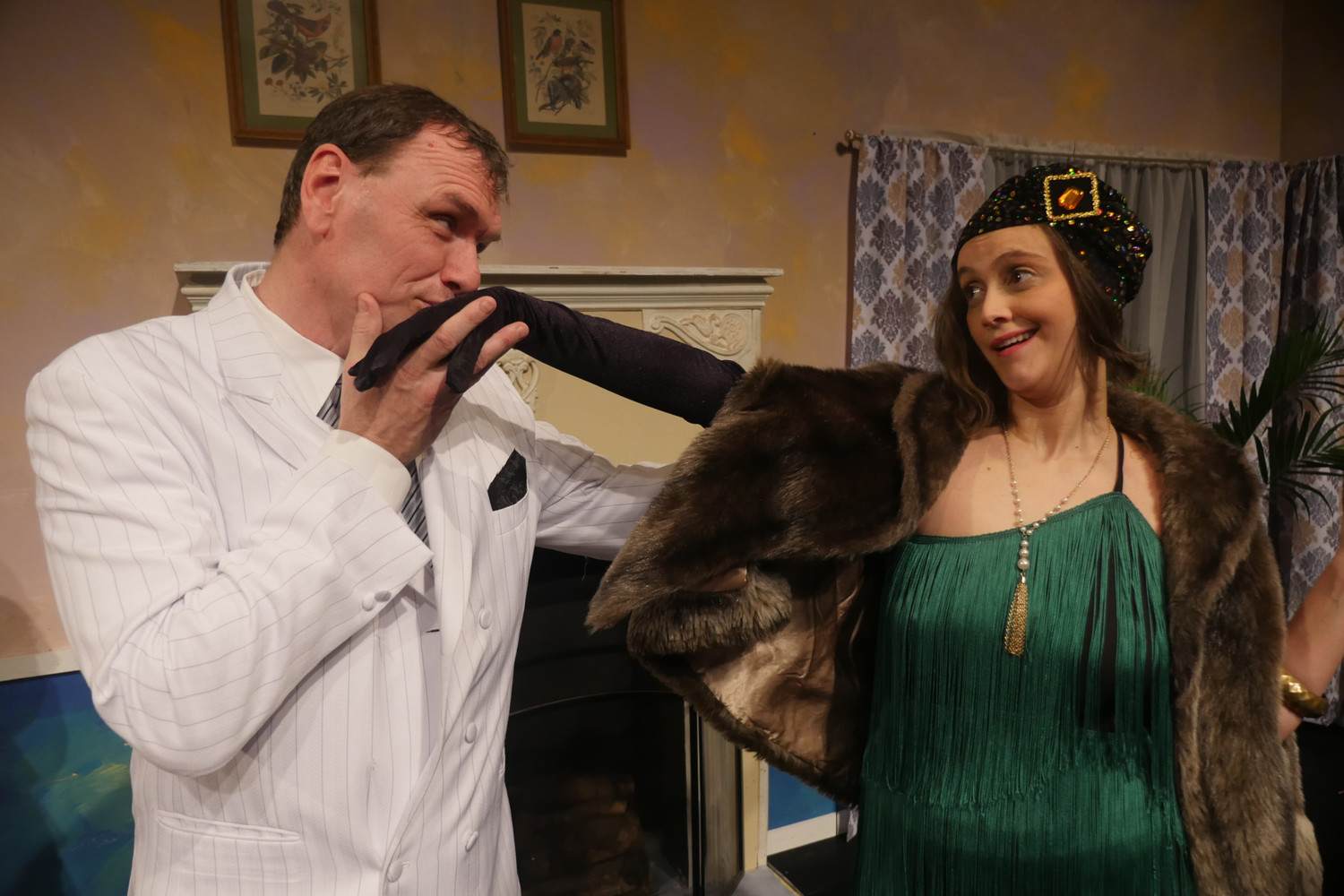Review: Actor's Gym Unearths a Gem in FALLEN ANGELS

When a playwright puts the finishing touches on his or her latest comedy, it's without any knowledge about how prevailing attitudes and expectations might change out in the audience over the next 93 years. No playwright has ever had the chance to look back that far, and that includes Noël Coward, whose FALLEN ANGELS is playing at Duke Energy Theater in an Actor's Gym production directed by Tony Wright.
Knowing Noël, I'd say he'd either gasp or laugh out loud. Opportunity knocks for Coward's protagonists, Julia Sterroll and Jane Banbury, when their husbands head off on a golfing weekend just when an old flame of both ladies, Maurice Duclos, sends them billet-doux saying that he'll be arriving back in London after an absence of many years - so many years that the husbands, Fred and Willy, have no idea of who Maurice is nor any knowledge of his torrid affairs with their wives.
After Fred's departure, Julia is momentarily left alone with her new smarty-pants maid, Saunders. That's when Jane arrives at the Sterrolls', all aflutter with the news. Julia, who was just a few minutes earlier discussing with Fred exactly how much fire was left in their mellowing marriage, hadn't yet read her note from Maurice. It quickly becomes evident, as the women discuss Maurice, that those flames still burn brightly, perhaps more brightly than ever. They're a little scared. What will they do when he arrives?
Their first impulse is exactly what an audience would expect - in 1925: to flee as quickly as they can to protect their honor, which presumably cannot withstand Maurice's irresistible charms. A mere 35 years after Oscar Wilde had declared, "The only way to get rid of temptation is to yield to it," such an outlook was still wicked, irresponsible, and risqué.
Nowadays, coaxed by Madison Avenue, amoral leaders, social media, and longstanding American traditions of fierce individuality, we find ourselves - regardless of gender - inwardly urging Julia and Jane, Go for it! Whereas we're taken aback in 2018 by the ladies' knee-jerk prissiness, their eventual decision to stay and face Maurice was immoral enough to give London's censors pause before allowing FALLEN ANGELS to be performed.
Once Julia and Jane have opted for what we perceive as the road-more-taken, you might expect that attitude adjustment becomes far less necessary. Yet in more subtle ways, the presumption of wickedness works its way deeply to the bones of Coward's comedy. Instead of building his comedy upon Julia and Jane's rekindled romances - and their wacky or delicious maneuverings to keep their husbands in the dark - we find an unexpected amount of time devoted to maintaining their wicked resolve. Here our complications arise from the women's resorting to martinis and champagne to sustain their courage during their excited vigil.
So it's helpful that Tony Wright and his design team keep reminding us that the people onstage are living in different times. While Tim Baxter-Ferguson's set design isn't the ultimate in elegance, the requirements of a British drawing room are met, including a baby grand where Saunders will upstage Julia. Davita Galloway's costumes, particularly the flapper-flavored outfits for the partying ladies as they sip their martinis, stamp the era most decisively.
The women must dominate this comedy, and Wright has found a marvelously varied trio. Originally played by Tallulah Bankhead, Julia is the formidable serenity that is serially agitated by Saunders, Jane, and Maurice to comical effect. Jennifer Barnette takes that serenity to a loftier, more angelic plane, slightly muting her discomfitures and giving more space for the eccentricities of Saunders and Jane to shine. Karina Caporino pounces on her opportunity as Jane with frenetic energy, more brittle and midlife than we've ever seen her, which easily makes Jane the most screwball of her trademark neurotics.
Erin Darcy as Saunders is possibly the most vivid period trimming in this whole confection, a servant who is more knowledgeable, widely travelled, and skilled than the mistress she serves, aware of her superiority and maybe a little bit haughty about it. Saunders' sophistication lays bare the delusion that the Sterrolls or the Banburys are living lives of consequence. Perhaps it's Darcy's aplomb at the piano that gives Barnette her best episode of humiliation.
In this context, Emmanuel Barbe is a perfect choice as Maurice. He is suave and self-assured, with a savoir-faire that is unmistakably French, yet he doesn't quite have the polish and youth that would make knees buckle in high society. Barbe's down-market elegance is still more than enough to make David Hensley as Fred and Michael Anderson as Willy seem gullible, dimwitted, and humdrum. Hensley as Fred seems to be the sort who feels like he's fulfilling his destiny by opening a newspaper at the breakfast table, while Anderson, once he reconciles with Fred and Jane, gives Willy exactly the smiling insouciance that Wright wants for his ending.
I have to go back to 2005 and The Tempest to find the last Actor's Gym production I reviewed. It's great to have Wright and his Gym back on the scene, especially when the Gym unearths a gem like this.
Photos by David Hensley
Reader Reviews
Videos

